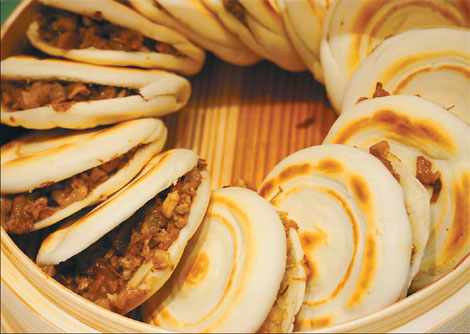A friend took me to a Shaanxi restaurant for lunch where I had my first taste of a Chinese hamburger, or roujiamo, which literally means meat between bread.
It was simply delicious, a lot better than any hamburger I have ever had before, whether it was at McDonald's or a five-star restaurant in San Francisco. Of course, other than the look, roujiamo is very different from the Western hamburgers we are used to.
 |
|
Roujiamo and yangrou paomo (below) served in Reallove Cuisine Restaurant in Beijing. Photos by Ye Jun / China Daily |
Only unleavened bread is used in roujiamo, and the filling is a thick stew of chopped meat, which can be lamb or beef, cooked with pepper and mixed herbs. About the size of a double-burger at McDonald's, roujiamo is a meal by itself.
Munching on my lamb roujiamo, I wondered why hasn't any entrepreneur built a fast food chain selling roujiamo in China to compete with McDonald's and KFCs. That seems such a natural thing to do.
I went back to the same Shaanxi restaurant to buy two roujiamo to go. I got my order individually packed in cute paper bags in a little more than five minutes. That's as quick as a takeout at McDonald's.
After I got home, I discovered another great advantage of roujiamo over a hamburger. Roujiamo are extremely microwave friendly. I just heated one in its paper bag in the microwave for 30 seconds and it tasted nearly as good as the one I had at the restaurant. Reheating can easily ruin a Western-style hamburger, rendering it inedible.
But of course, not all traditional Chinese snacks can be repackaged for fast food restaurants. Some years ago, a Hong Kong entrepreneur opened a fast food chain selling Cantonese dim sum. The venture failed largely because dim sum dishes are complicated to make, requiring too many ingredients and long cooking times. What's more, they are best served freshly steamed.
Another promising fast food venture in Hong Kong was launched by a Filipino entrepreneur selling hot dogs. Many of my American friends agreed that the hot dogs were the best outside Chicago. But it failed to catch on with the locals because of the high price. The owner told me that the sausages he used were imported and the relishes weren't cheap either.
In Hong Kong, wonton noodle soup is our fast food. There used to be wonton noodle soup shops everywhere in the city, where you could drop in, order a bowl with a vegetable side dish, slurp them up in 10 minutes and then be on your way, refreshed and satisfied at a most affordable price.
Not anymore. Escalating rents have driven most shops in the city center out of business. Now, Hong Kong people have to travel a long way to satisfy their craving for the fast food they love.
Roujiamo are different. First, they're portable, meaning you can buy them at a roadside stand and enjoy them in a park. That's what I have been doing in Shanghai over the past few weeks when the weather was sunny and crisp. The total meal, including a Coca-Cola, cost less than 15 yuan ($1.9).
I just wished there were as many outlets selling this Shaanxi specialty as there are McDonald's so I don't have to make the long trek from the office to get one for lunch. There is a McDonald's half a block away and there is another one further down the road. Perhaps one day, some Chinese entrepreneurs who have the marketing savvy will open restaurant chains selling roujiamo or wanton noodle soup.
The author is a senior editor with China Daily. [email protected]
(China Daily 11/20/2013 page8)